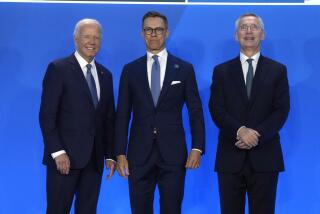Dispute Over Details Stalls U.S.-Commonwealth Arms Pact : Disarmament: But Baker and Kozyrev agree to set up a joint early warning center to track ballistic missiles.
- Share via
MOSCOW — The United States and Russia now claim to be friends, even allies, but as Secretary of State James A. Baker III and Russian Foreign Minister Andrei V. Kozyrev discovered Tuesday, it is a complex thing to clear up the debris of the Cold War.
Baker and Kozyrev met for two hours without resolving any of the disputed details of a new arms control treaty to sharply reduce the awesome arsenals of long-range nuclear weapons left over from decades of hostility between the United States and the defunct Soviet Union.
But they agreed to establish a new early warning center to track ballistic missiles worldwide, the first concrete example of defense cooperation between the former enemies.
The plan calls for Washington and Moscow to share technology in building the complex of radars, heat sensors, satellites and other devices. But it falls far short of the sort of exchange of technology on missile defenses that both sides have talked about in the past.
Presumably, the proposal is intended to protect Russia, the United States and their allies from the threat posed by proliferation of ballistic missiles to countries like Iraq. In the past, antimissile programs were designed primarily to defend one superpower from the other, the only nations capable of saturation missile attack.
“If we are talking about early warning we are doing together, we’re obviously not doing it against them,” a senior State Department official said.
As now envisioned, the planned center would warn a nation that it is under missile attack, but it would not, in itself, have the capability to shoot down the incoming missiles.
Despite their plan to cooperate on tracking missiles, Baker and Kozyrev were frustrated by their inability to agree on cuts in the nuclear arsenals that seem to be relics of past confrontation.
“We are thinking now about destroying all these weapons that have been amassed during the preceding decades,” Kozyrev said at a news conference with Baker. “These are not political problems. They are essentially technical ones.”
Baker agreed but added, “There are some very substantial practical problems.”
Kozyrev said he and Baker “have decided not only to move from the area of confrontation to a new partnership, but we also agreed that eventually we might become allies.”
President Bush and Russian President Boris N. Yeltsin were unable to resolve those arms control issues during their generally harmonious meeting at Camp David earlier this month. They agreed that Baker and Yeltsin would settle the details when the secretary of state visited Moscow. Baker and Yeltsin failed to solve the complex problems of counting, definition, timing and the like during their three-hour meeting Monday, so they decided to let Baker and Kozyrev tackle them on Tuesday.
Still unable to settle the matter, Baker and Kozyrev decided to meet next month to try again. Both men are scheduled to be in Brussels on March 10 for a meeting of the newly established consultative council of members of the North Atlantic Treaty Organization and the former Warsaw Pact.
Both sides hope to have a new arms control pact ready for signing when Yeltsin visits Washington for a full-scale summit later this year.
Both Baker and Kozyrev said they agreed to try to accelerate talks on the new arms control pact.
Before heading back to Washington at the end of his 10-day trip through the ruins of the Soviet Union, Baker met at his Moscow hotel with Tengiz Sigua, the acting prime minister of the military-imposed government of Georgia, the only former Soviet republic that Baker has not visited in person.
More to Read
Sign up for Essential California
The most important California stories and recommendations in your inbox every morning.
You may occasionally receive promotional content from the Los Angeles Times.













